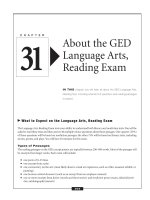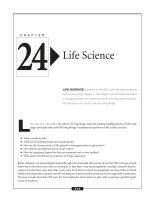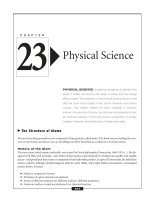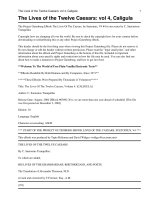About the ged writting exam 4 pot
Bạn đang xem bản rút gọn của tài liệu. Xem và tải ngay bản đầy đủ của tài liệu tại đây (103.56 KB, 6 trang )
I
ncor
rect
: What is the side effects of this
medication?
C
orrect: What are the side effects of this
medication?
Gerunds and Infinitives
Gerunds and infinitives have given many students of Eng-
lish a grammar headache, but they are not so difficult to
master. Gerunds, as we noted earlier, look like verbs
because they end in –ing, but they actually function as
nouns in sentences:
Tracy loves camping
.
Here, the “action” Tracy performs is loves. The thing
(noun) she enjoys is camping. In the following sentence,
however, camping is the action Tracy performs, so it is
functioning as a verb, not as a gerund:
Tracy is camping
in the Pine Barrens next week.
Words ending in –ing can also function as adjectives:
Some of our camping
gear needs to be replaced
before our trip.
Here’s another example of how the same word can
have three different functions:
Ve r b : He is s
c
reaming loudly.
Gerund (noun): That s
creaming is driving me
crazy!
Adjective: The s
creaming boy finally stopped.
What this means is that you can’t count on word end-
ings to determine a word’s part of speech. Lots of words
that look like verbs may not be. It’s how they function in
the sentence that counts.
Infinitives are the base (unconjugated) form of the
verb preceded by to: to be, to delay, to manage. They are
often part of a verb chain, but they are not the main verb
(main action) of a sentence:
Priya likes t
o write poems.
In this example, likes is the main verb; what Priya likes
(the action she likes to take) is to write poems.
WHEN TO
USE INFINITIVES AND GERUNDS
In many situations, you may be uncertain whther to use
an infinitive or a gerund. Which is correct: I like to swim
or I like swimming? In this case, both are correct; like,
hate, and other verbs that express preference can be fol-
lowed by either a gerund or infinitive. But other verbs
can only be followed by one or the other. Here are a few
helpful guidelines:
■
Always use a gerund after a preposition.
Keza thought that by taking the train, she would
save money and time.
Noriel was afraid of offending her host, but she
couldn’t eat the dinner.
■
Always use a gerund after the following verbs:
admit dislike practice
appreciate enjoy put off
avoid escape quit
can’t help finish recall
consider imagine resist
delay keep risk
deny miss suggest
discuss postpone tolerate
We should discuss buying a new computer.
I am going to quit smo
king.
■
In general, use an infinitive after these verbs:
agree decide need refuse
ask expect offer venture
beg fail plan want
bother hope pretend wish
claim manage promise
Aswad promises to be back by noon.
Fatima failed t
o keep her promise.
– USAGE–
55
■
When a noun or pronoun immediately follows
these verbs, use an infinitive:
advise expect remind
allow force require
ask like tell
cause need urge
command order want
convince persuade warn
encourage
I’d like you to reconsider my offer.
The committee needs you t
o organize this event.
Pronouns
Pronouns, as we noted earlier, replace nouns. This keeps
us from having to repeat names and objects over and
over. But pronouns can be a bit tricky at times. This sec-
tion reviews the different kinds of pronouns and the
rules they follow.
Personal Pronouns
Personal pronouns refer to specific people or things. They
can be either singular (I ) or plural (we); they can be sub-
jects (I ) or objects (me).
SUBJECT OBJECT
singular I me
you you
he him
she her
it it
plural we us
they them
Pronoun mistakes are often made by using the subject
form when you really need the object form. Here are two
guidelines to follow:
■
Always use the object pronoun in a prepositional
phrase. Pronouns and nouns in prepositional
phrases are always objects.
He promised to bring a souvenir for Betty and me
.
Please keep this between us
.
■
Always use the subject pronoun in a than con-
struction (comparison). When a pronoun follows
than, it is usually part of a clause that omits the
verb in order not to repeat unnecessarily.
I realize that Alonzo is more talented than I
. [than
I am]
Sandra is much more reliable than he
. [than he is]
Indefinite Pronouns
Unlike personal pronouns, indefinite pronouns, such as
anybody and everyone, don’t refer to a specific person.
The following indefinite pronouns are always singular
and require singular verbs:
anyone, anybody everyone, everybody
no one, nobody someone, somebody
either, neither each
one
E
verybody has a chance to win.
N
either child admits to eating the cookies.
H
as anyone seen my keys?
The following indefinite pronouns are always plural:
both few many several
Both sound like good options.
Only a few are left.
These indefinite pronouns can be singular or plural,
depending upon the noun or pronoun to which they
refer:
all any most none some
– USAGE–
56
Some of the mone
y is counterfeit.
Some of the c
oins are valuable.
None of the animals
have been fed.
All of the br
ead is moldy.
Pronoun–Antecedent Agreement
Just as subjects (both nouns and pronouns) must agree
with their verbs, pronouns must also agree with their
antecedents—the words they replace. For example, in the
following sentence:
Childr
en
will often believe everything the
ir
parents tell the
m
the word children is the antecedent and is replaced by
their and them in the sentence. Because children is plural,
the pronouns must also be plural.
Indefinite pronouns can also be antecedents. Singular
indefinite pronouns require singular pronouns:
E
ver
yone has his o
r her own reasons for coming.
Neither of the physicists could explain what she
saw.
A Bad Habit
One of the most common mistakes we make
when speaking and writing is an error of
pronoun-antecedent agreement. We often say
sentences like the following:
Did everyone bring their notebooks?
Most people make this mistake because it’s
easier (shorter and faster) to say their—but it’s
not correct. When the antecedent is singular,
the pronouns must be singular, too:
Did everyone bring his or her notebook?
Plural indefinite pronouns, on the other hand, require
plural pronouns, just like they need plural verbs:
both few many several
B
oth of them have finished their work.
Only a f
ew are still in their original cases.
Finally, those pronouns that can be either singular or
plural, depending upon the noun or pronoun to which
they refer, should take the pronoun that matches their
referent. If the antecedent is singular, the pronoun and
verb must also be singular. If the antecedent is plural,
they must be plural:
all any most none some
All of the chocolate is gone. It was delicious!
All of the cookies are gone. They were delicious!
None of the information is accurate; it’s all out of
date.
None of the facts are accurate; they are all out of
date.
Pronoun Consistency
Just as you need to be consistent in verb tense, you
should also be consistent in your pronoun point of view.
Pronouns can be:
Singular Plural
First person I, me we, us, our
Second person you you (all)
Third person he, she, it they, them, their
one
A passage that begins in the third person plural should
continue to use that third person plural point of view.
I
ncorrect: We have tested our hypothesis and
the team believes it is correct.
C
orrect: We have tested our hypothesis and we
believe it is correct.
I
ncorrect: If you prepare carefully, one can
expect to pass the exam.
C
orrect: If you prepare carefully, you can
expect to pass the exam. OR
If one prepares carefully, one can
expect to pass the exam.
Possessive Pronouns
The possessive pronouns its, your, their, and whose are often
confused with the contractions it’s (it is or it has), you are
(you are), they’re (they are) and who’s (who is). Because we
– USAGE–
57
– USAGE–
58
use apostrophes to show possession in nouns (Louise’s
truck, the rug’s pattern), many people make the mistake
of thinking that pronouns use apostrophes for posses-
sion, too. But possessive pronouns do not take apostro-
phes. When a pronoun has an apostrophe, it always shows
contraction.
POSSESSIVE PRONOUN MEANING EXAMPLE
its belonging to it The dog chased its tail.
your belonging to you Your time is up.
their belonging to them Their words were comforting.
whose belonging to who Whose tickets are these?
CONTRACTION
it’s it is It’s time to eat.
you’re you are You’re not going to believe your eyes.
they’re they are They’re getting their tickets now.
who’s who has Who’s got my tickets?
who is Who’s sitting in front?
The pronouns who, that, and which are also often con-
fused. Here are the general guidelines for using these
pronouns correctly:
■
Use who or whom when referring to people:
She is the one who should make that decision,
not me.
■
Use that when referring to things:
This is the most important decision that she will
make as director.
■
Use which when introducing clauses that are not
essential to the information in the sentence,
unless they refer to people. In that case, use who.
Emily married Sonny, who has been in love with
her since first grade.
This film, which is a comedy, would be a good gift
for Daniel.
Adjectives and Adverbs
Adjectives and adverbs help give our sentences color; they
describe things and actions. Adjectives describe nouns
and pronouns and tell us which one, what kind, and how
many. See the following table.
Adverbs, on the other hand, describe verbs, adjectives,
and other adverbs. They tell us where, when, how, and to
what extent. See the following table.
WHICH ONE? WHAT KIND? HOW MANY?
that book romance novel several chapters
the other class steep expense multiple choices
the last song jazzy melody six awards
Remember to keep modifiers as close as possible to
what they modify.
Fewer/Less, Number/Amount
As a rule, use the adjective fewer to modify plural nouns
or things that can be counted. Use less for singular nouns
that represent a quantity or a degree. Most nouns to
which an –s can be added require the adjective fewer.
Use less
salt this time. Use fewer eggs this time.
I had less r
eason
to go I had fewer reasons to go
this time. this time.
Good/Bad, Well/Badly
These pairs of words—good/well, bad/badly—are often
confused. The key to proper usage is to understand their
function in the sentence. Good and bad are adjectives;
they should be used to modify only nouns and pro-
nouns. Well and badly are adverbs; they should be used
to modify verbs.
I was surprised by how g
ood Sebastian’s cake was.
Jennelle hasn’t been f
eeling well lately.
Her att
itude is good, but she didn’t do well in the
interview.
Comparisons
An important function of adjectives and adverbs is com-
parisons. When you are comparing two things, use the
comparative form (–er) of the modifier. If you are com-
paring more than two things, use the superlative form
(–est) of the modifier.
To create the comparative form, either:
1. add –er to the modifier or
2. place the word more or less before the modifier.
In general, add –er to short modifiers (one or two syl-
lables). Use more or less with modifiers of more than two
syllables.
cheaper less expensive
smarter more intelligent
To create the superlative form, either:
1. add –est to the modifier or
2. place the word most or least before the modifier.
Again, as a general rule, add –est to short modifiers
(one or two syllables). Use most or least with modifiers
that are more than two syllables.
Wanda is mor
e experienced than I, but I am the
most
familiar with the software.
Ahmed is clearly the smar
test student in the class.
Double Comparisons and
Double Negatives
Be sure to avoid double comparisons. Don’t use both
–er/–est and more/less or most/least together.
I
ncorrect: She has the most longest hair I’ve
ever seen.
C
orrect: She has the longest hair I’ve ever
seen.
I
ncorrect: Minsun is more happier now.
C
orrect: Minsun is happier now.
– USAGE–
59
WHERE? WHEN? HOW? TO WHAT EXTENT?
The plane flew south. Jude arrived early. She sang beautifully. Anthony is very talented.
Put the chair here. She registered late. The system is behaving Eleanor is still extremely ill.
erratically.
I was walking back to camp. Let’s meet again They fought bravely. The gas is dangerously low.
tomorrow.
Likewise, be sure to avoid double negatives.When a
negative word such as no or not is added to a statement
that is already negative, a double negative—and poten-
tial confusion—results. Hardly and barely are also nega-
tive words. Remember, one negative is all you need.
I
nco
rrect: He doesn’t have no idea what she’s
talking about.
C
or
rect: He doesn’t have any idea what she’s
talking about.
He has no
idea what she’s talking
about.
I
ncorrect: I can’t hardly wait to see you.
C
orrect: I can hardly wait to see you.
I can
’t wait to see you.
Prepositional Idioms
Another aspect of usage that may be covered on the GED
is prepositional idioms: the specific word/preposition
combinations that we use in the English language, such
as take care o
f
and according t
o
. The following is a list of
some of the most common prepositional idioms. Review
the list carefully to be sure you are using prepositional
idioms correctly.
– USAGE–
60
according to
afraid of
anxious about
apologize to (someone)
apologize for
(something)
approve of
ashamed of
aware of
blame (someone) for
(something)
bored with
capable of
compete with
complain about
composed of
concentrate on
concerned with
congratulate on
conscious of
consist of
depend on/upon
equal to
except for
fond of
from now on
from time to time
frown on/upon
full of
glance at (something)/
glance through (some-
thing, e.g., a book)
grateful to (someone)
grateful for (something)
in accordance with
incapable of
in conflict
inferior to
insist on/upon
in the habit of
in the near future
interested in
knowledge of
next to
of the opinion
on top of
opposite of
prior to
proud of
regard to
related to
rely on/upon
respect for
responsible for
satisfied with
similar to
sorry for
suspicious of
take care of
thank (someone) for
(something)
tired of
with regard to









